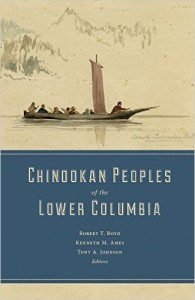Chinookan Peoples of the Lower Columbia
by Robert T. Boyd (Editor), Kenneth M. Ames (Editor), & Tony A. Johnson (Editor).

Chinookan peoples have lived on the Lower Columbia River for millennia. Today they are one of the most significant Native groups in the Pacific Northwest, although the Chinook Tribe is still unrecognized by the United States government. In Chinookan Peoples of the Lower Columbia River, scholars provide a deep and wide-ranging picture of the landscape and resources of the Chinookan homeland and the history and culture of a people over time, from 10,000 years ago to the present. They draw on research by archaeologists, ethnologists, scientists, and historians, inspired in part by the discovery of several Chinookan village sites, particularly Cathlapotle, a village on the Columbia River floodplain near the Portland-Vancouver metropolitan area. Their accumulated scholarship, along with contributions by members of the Chinook and related tribes, provides an introduction to Chinookan culture and research and is a foundation for future work.
Robert T. Boyd is a research anthropologist at Portland State University and the author of The Coming of the Spirit of Pestilence. Kenneth M. Ames is professor emeritus of anthropology at Portland State University and lead author of Peoples of the Northwest Coast. Tony A. Johnson is Chairman of the Chinook Nation.
Contents:
List of Maps, Tables, and Online Materials
Preface/ Robert T. Boyd
Acknowledgements
The Chinook People Today/ Tony A. Johnson
Part I. The Chinookan World
1. Environment and Archaeology of the Lower Columbia/Elizabeth A Sobel, Kenneth M. Ames, and Robert J. Losey
2. Cultural Geography of the Lower Columbia/David V. Ellis
3. Ethnobiology: Nonfishing Subsistence and Production/D. Ann Trieu Gahr
4. Aboriginal Fisheries of the Lower Columbia River/Virginia L. Butler and Michael A. Martin
5. Lower Columbia Trade and Exchange Systems/Yvonne Hajda and Elizabeth A. Sobel
6. Houses and Households/Kenneth M. Ames and Elizabeth A. Sobel
7. Social and Political Organization/Yvonne Hajda
8. Chinookan Oral Literature/Dell Hymes and William R. Seaburg
9. Lower Columbia Chinookan Ceremonialism/Robert T. Boyd
10. Lower Columbia River Art/Tony A. Johnson and Adam McIsaac
Part II. After Euro-American Contact
11. Lower Chinookan Disease and Demography/Robert T. Boyd
12. The Chinookan Encounter with Euro-Americans in the Lower Columbia River Valley/William L. Lang
13. Chinuk Wawa and Its Roots in Chinookan/Henry B. Zenk and Tony A. Johnson
14. “Now You See Them, Now You Don’t”: Chinook Tribal Affairs and the Struggle for Federal Recognition/Andrew Fisher and Melinda Marie Jette
15. Honoring Our Tilixam: Chinookan People of Grand Ronde/David G. Lewis, Eirik Thorsgard, and Chuck Williams
16. Chinookan Writings: Anthropological Research and Historiography/Wayne Suttles and William L. Lang
Bibliography
Contributors
Index
Reviews:
A Choice Outstanding Academic Title for 2014
“This excellent book…is divided into two parts, one focusing on what is known of the Chinook precontact, the other on their postcontact world. With chapters ranging from the environment, subsistence, and exchange to social organization and culture, part 1 has something for all. Of note, and certainly heartbreaking, are the chapters in the second part that discuss the politico-legal situation and history of the Chinookan peoples. Highly recommended.”―Michael Ebert, Choice
“[The book] illustrates how rich and effective tribal and academic collaborations can be. Twenty-one tribal professionals and scholars (anthropologists, archaeologists, historians) contributed deeply researched chapters to this collection, and together their entries expand existing knowledge about and interpretations of Chinook peoples.”―Laurie Arnold (Colville, Gonzaga University), Columbia: The Journal of Northwest History
“This mature and welcome work provides lifelong academic insights concerning complex hunter-gatherers, regional social networks, ethnogenesis of modern Chinooks, comparisons of highly varied research, and strong voices of living Chinooks.”―Jay Miller, Western Historical Quarterly
“With coverage that ranges from 10,000 or more years to the present, Chinookan Peoples of the Lower Columbia explores the Chinookan world before and after contact, the advent and impacts of disease, demographic shifts, fishing and hunting practices and rights, treaty-making, and legal decisions―just to name a few of the topics under investigation. Compellingly, what is revealed is not always what one might expect.”―Cary C. Collins, Journal of the West
“Chinookan Peoples of the Lower Columbia is a masterful piece of scholarship….This is a densely packed volume, and a corrective to many long-held assumptions…[which] examines all aspects of Chinookan history with fresh perspective….This book is a new essential, and will be welcomed by anyone interested in a deeper, fresher, more nuanced exploration of our region’s native history. Highly recommended.” Paula Becker, “Book of the Fortnight”, HistoryLink.org-the Free Online Encyclopedia of Washington State History
“In this impressive volume, the editors bring together the foremost scholars in the field–anthropologists, archaeologists, historians, and Chinook cultural experts to produce a remarkably comprehensive study of Chinookan peoples past, present, and hopefully, future. Chinookan Peoples is really a tour de force….tight, focused, well-organized, comprehensive, even encyclopedic (in the best sense of the word); and it contains not only the latest scholarship but also an impressive collection of maps, tables, and online materials that point scholars toward even more resources….an extraordinary resource that will be appreciated by scholars, teachers, and anyone else interested in Native American history and cultural persistence in the Pacific Northwest and beyond….What shines through this volume is how fiercely Chinook peoples have clung to their tribal identity, against all odds….Now Chinook peoples have a written testament to their shared history and culture that makes such a solid case for Chinook federal tribal recognition, it would seem inconceivable, after reading this book, that the BIA’s Branch of Acknowledgement and Research (BAR) could deny them.–David Arnold, Pacific Historical Review
Product Details
Hardcover: 448 pages
Publisher: University of Washington Press (September 15, 2013)
Language: English
ISBN-10: 0295992794
ISBN-13: 978-0295992792
Paperback (due out August 2015)
available in hardcover or paperback
to order, go to: www.washington.edu/uwpress/search/books/BOYCHI.html